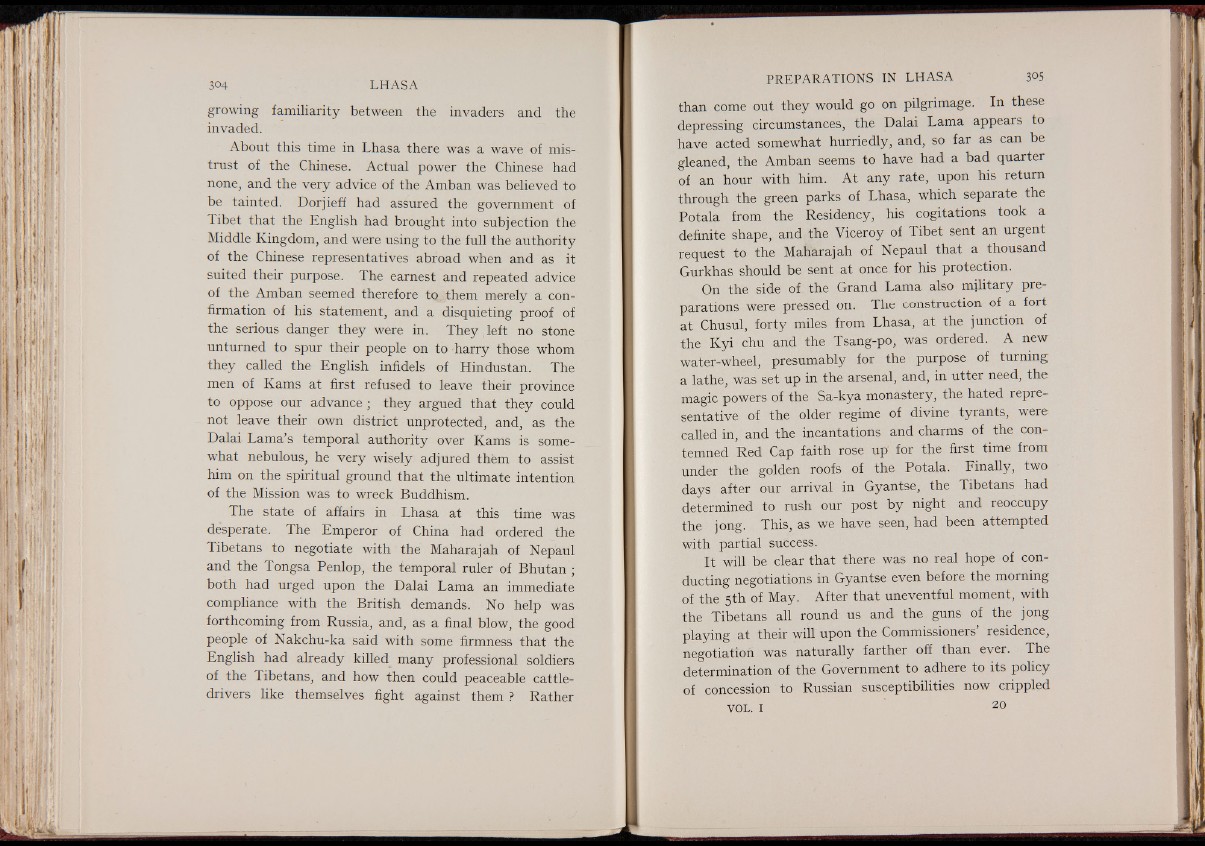
growing familiarity between the invaders and the
invaded.
About this time in Lhasa there was a wave of mistrust
of the Chinese. Actual power the Chinese had
none, and the very advice of the Amban was believed to
be tainted. Dorjieff had assured the government of
Tibet that the English had brought into subjection the
Middle Kingdom, and were using to the full the authority
of the Chinese representatives abroad when and as it
suited their purpose. The earnest and repeated advice
of the Amban seemed therefore to, them merely a confirmation
of his statement, and a disquieting proof of
the serious danger they were in. They left no stone
unturned to spur their people on to harry those whom
they called the English infidels of Hindustan. The
men of Kams at first refused to leave their province
to oppose our advance; they argued that they could
not leave their own district unprotected, and, as the
Dalai Lama’s temporal authority over Kams is somewhat
nebulous, he very wisely adjured them to assist
him on the spiritual ground that the ultimate intention
of the Mission was to wreck Buddhism.
The state of affairs in Lhasa at this time was
desperate. The Emperor of China had ordered the
Tibetans to negotiate with the Maharajah of Nepaul
and the Tongsa Penlop, the temporal ruler of Bhutan ;
both had urged upon the Dalai Lama an immediate
compliance with the British demands. No help was
forthcoming from Russia, and, as a final blow, the good
people of Nakchu-ka said with some firmness that the
English had already killed many professional soldiers
of the Tibetans, and how then could peaceable cattle-
drivers like themselves fight against them ? Rather
than come out they would go on pilgrimage. In these
depressing circumstances, the Dalai Lama appears to
have acted somewhat hurriedly, and, so far as can be
gleaned, the Amban seems to have had a bad quarter
of an hour with him. At any rate, upon his return
through the green parks of Lhasa, which separate the
Potala from the Residency, his cogitations took a
definite shape, and the Viceroy of Tibet sent an urgent
request to the Maharajah of Nepaul that a thousand
Gurkhas should be sent at once for his protection.
On the side of the Grand Lama also military preparations
were pressed on. The construction of a fort
at Chusul, forty miles from Lhasa, at the junction of
the Kyi chu and the Tsang-po, was ordered. A new
water-wheel, presumably for the purpose of turning
a lathe, was set up in the arsenal, and, in utter need, the
magic powers of the Sa-kya monastery, the hated representative
of the older regime of divine tyrants, were
called in, and the incantations and charms of the contemned
Red Cap faith rose up' for the first time from
under the golden roofs of the Potala. Finally, two
days after our arrival in Gyantse, the Tibetans had
determined to rush our post by night and reoccupy
the jong. This, as we have seen, had been attempted
with partial success.
It will be clear that there was no real hope of conducting
negotiations in Gyantse even before the morning
of the 5th of May. After that uneventful moment, with
the Tibetans all round us and the guns of the jong
playing at their will upon the Commissioners’ residence,
negotiation was naturally farther off than ever. The
determination of the Government to adhere to its policy
of concession to Russian susceptibilities now crippled
v o l . 1 20